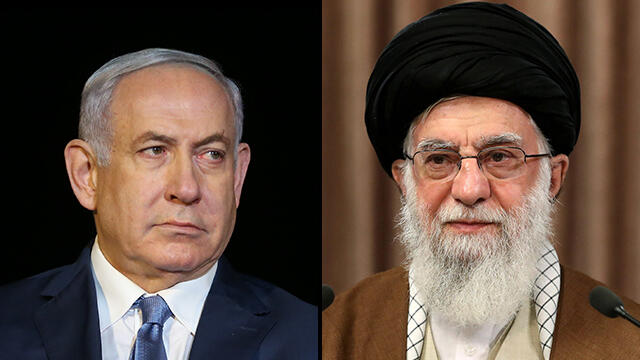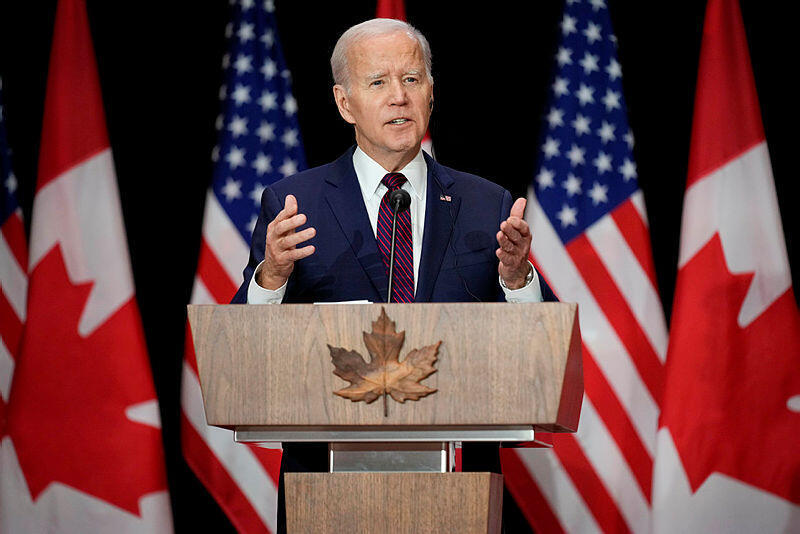U.S. President Joe Biden’s criticism of Prime Minister Benjamin Netanyahu and his public statement that the Israeli premier will not be invited to the White House anytime soon were released shortly after the dramatic statement by the chairman of the Joint Chiefs of Staff, Mark Milley, regarding the Iranian nuclear program.
Related stories:
During his testimony to the U.S. Senate, which has not received sufficient attention in Israel, Milley stated that Iran could produce enough fissile material for a nuclear weapon in less than two weeks and would take a few more months to manufacture a nuclear weapon.
2 View gallery


Prime Minister Benjamin Netanyahu and Iranian Supreme Leader Ayatollah Ali Khamenei
(Photo: Elad Gershgorn, AFP)
His statements are further evidence of the failure of the Israeli strategy against Tehran’s nuclear program. For years, Israel has attempted to prevent Iran from reaching the military nuclear threshold but instead has brought it significantly closer.
The push by the Trump administration to withdraw from the nuclear agreement without a viable alternative to stop enrichment progress, and mainly the lack of understanding that the current state of the program is significantly different from what it was a decade ago and requires the adoption of an alternative strategy, have led Iran to the nuclear threshold.
The only thing separating them now from the ability to produce nuclear weapons is a political decision by the leadership in Tehran.
Over the past few months, there had been hopes for improvement in the situation with Iran amid the growing domestic unrest in the Islamic Republic and the increasing pressure on it, against the backdrop of the supply of kamikaze drones to Russia in the Ukrainian conflict.
However, the demonstrations that erupted in late September 2022 have subsided in recent weeks, and while the situation is still volatile, especially in light of the crippling economic crisis in the country, there is currently no real threat to the stability of the regime in Tehran.
Meanwhile, the reinstatement of diplomatic relations between Iran and Saudi Arabia, and its growing rapprochement with other Arab countries, including the United Arab Emirates, Bahrain, and Egypt, indicate that hopes for forming a regional-international coalition against it are currently unfounded."
"In these circumstances, it was incumbent upon Israel to formulate an alternative strategy against Iran, primarily through coordination with the U.S. administration to draw a "red line" after which action would be taken against its nuclear program.
There should also be a fundamental readiness to consider diplomatic moves aimed at pushing the program back in return for economic concessions, given that a policy based solely on "sticks" could push Iran to enrich uranium beyond the 90% threshold.
A deterrent military option should also be prepared, and a strategic unambiguity should be established with respect to the regime in Tehran to avoid miscalculation and escalation toward war.
The increasing tension between Israel and the United States, as evident in President Biden's remarks, endangers the ability to advance joint moves with Washington to deter Iran from making a strategic decision to cross the nuclear threshold.
The domestic political realities in Israel and the developments in its relations with the U.S. do not escape the attention of Iranian authorities. The media in the country has portrayed, in recent weeks, the domestic crisis in Israel as a reflection of its growing weakness and the deepening divisions in society.
In addition to the obvious security aspect, this reflects a growing assessment that Israel is constantly weakening, its capabilities are limited, and its threats of attack are unfounded.
Especially now, Israel requires a responsible government that is capable of formulating an updated strategy and leading the necessary measures vis-à-vis the United States.
However, in Jerusalem, there is a government obsessed with promoting a judicial overhaul and led by extremist, religious, and messianic elements, including ministers who declare that Israel can manage without Washington's support.
This conduct poses a serious threat to Israel's national security at one of the gravest and most significant crossroads it has ever faced.
Dr. Raz Zimmt is an Iran expert at the Institute for National Security Studies (INSS) and the Alliance Center for Iranian Studies at Tel Aviv University. Danny Citrinowicz is the former head of the Iran Division in the IDF Research Department and a current Iran researcher at the Institute for National Security Studies.


